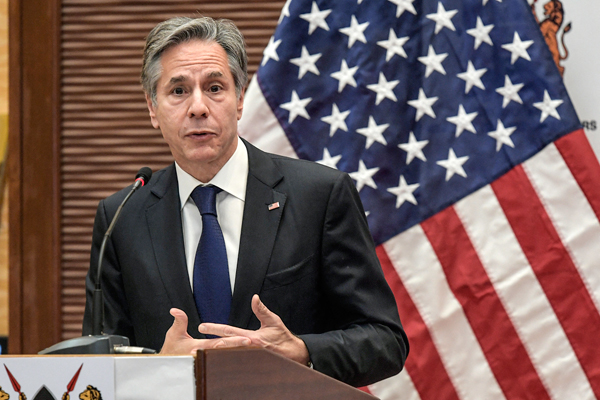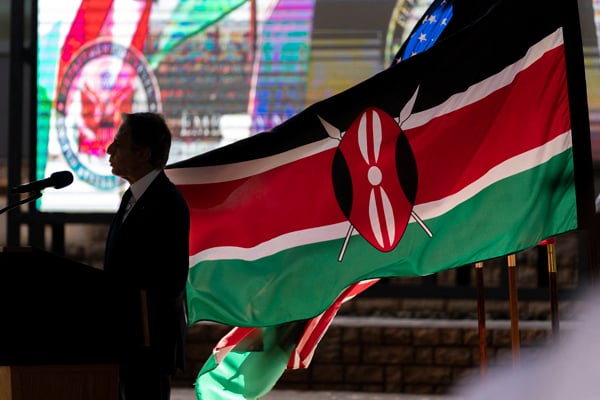US sidesteps stragetic ally Uganda on democracy summit

US President Joe Biden and Uganda's President Museveni. PHOTO/COMBO
What you need to know:
- But Uganda’s Foreign ministry dismisses the omission, saying the country is not dying to be at the summit and insists that no power can disregard Uganda’s geo-strategic and military influence in the Great Lakes region.
Uganda has been left out of 110 state actors from different parts of the world that have been invited to a democracy summit called by United States President Joe Biden, triggering off an angry reaction from the Ministry of Foreign Affairs in Kampala.
The State Minister for Foreign Affairs in-charge of International Affairs, Mr Henry Oryem Okello, told Sunday Monitor on Friday that Uganda is not desperate to attend the summit, but hastened to add that the snub was a “big mistake” on the part of the US government.
“We are not dying to be there, but what we know is that whatever you are trying and do and try to ignore us, well, big mistake,” Mr Oryem Okello told Sunday Monitor.
The summit
A statement on the website of the US’ Department of State indicates that the virtual summit, which is to run from December 9 to 10, is the first of two summits on democracy that President Biden intends to host during his four-year tenure.
The summits are aimed at bringing together leaders from government, civil society and the private sector to “set forth an affirmative action agenda for democratic renewal and to tackle the greatest threats faced by democracies today through collective action.”
The mix of invitees include both liberal, and weaker democracies, and states with authoritarian characteristics.
The countries includes 39 from Europe; 27 from the Americas; 21 from Asia and Pacific; four from South Central Asia; two from the Middle East.
Sub-Saharan Africa, within which Uganda falls, enjoys robust participation with 17 invitees.
Uganda has been considered a key ally of the United States, which makes its absence from the list of invitees from Africa conspicuous. Uganda has also been the recipient of significant development and security assistance from the US.
The list instead has Uganda’s neighbours Kenya and DR Congo, and other countries such as Angola, Namibia, Malawi, Nigeria, Senegal and South Africa.
Uganda reacts
Mr Oryem Okello took exception to Uganda’s exclusion from the summit, saying it amounted to ignoring Uganda’s influence in the region.
“Be it in democracy, be in trade, be it in security, you cannot ignore us. You cannot do anything in this region without Uganda. Impossible!” Mr Oryem Okello said.
Indeed, key considerations for the invitation by Biden hinged on regional dynamics, broader US strategic interests, including counterbalancing unfriendly interests and assisting it in counter-terrorism.
However, Dr Kasaija Phillip Apuuli, who teaches in the Department of Political Science and Public Administration at Makerere University, dismissed Mr Oryem Okello’s take, saying so much has changed in the Great Lakes region.
“There are countries which used to think they had a natural right to be the leaders of the Great Lakes region, but things have changed. There are new actors” Dr Kasaija told Sunday Monitor.
Dr Kasaija said US Secretary of State Antony Blinken’s decision to skip Uganda and only visit Kenya, Nigeria and Senegal when he visited Africa between November 15 and 20 should have been instructive to Uganda.
“When you see that some of these countries are not even on the itinerary [Blinken’s], it means changes are happening, especially in the way the Americans look at these regimes,” Dr Kasaija says.
But Mr Oryem Okello thinks Dr Kasaija’s take is purely academic.
“I am on the steering [wheel] at the moment. I am the one in charge of driving this thing. Those people you talked to; what are they driving? They are just there reading books and papers at universities and institutions. They have never practically managed foreign policy. Those are opinion specialists. What have they done really? I have been practically in this business for 18 years,” Mr Oryem Okello said.
Questionable democratic credentials
A diplomat who talked to Sunday Monitor on condition of anonymity said whereas one of the aims of the summit is to avail participants “an opportunity to listen, learn, and engage with a diverse range of actors whose support and commitment is critical for global democratic renewal”, Uganda’s practice of democracy suggests that it is no longer considered critical to such a renewal.
The spokesperson of the US Embassy in Kampala, Mr Anthony Kujawa, declined to be drawn into discussing the merits and demerits of not inviting Uganda, a critical US ally in eastern Africa. He only said: “The United States reached out to a regionally diverse set of well-established and emerging democracies whose progress and commitments will advance a more just and peaceful world.”
No surprise
But Dr Kasaija insists the snub should not come as a surprise.
“You know the critical sentiments that the Americans have raised and keep raising on the issues of democracy, gay rights and human rights. All that is part of the conversation on democracy. We have a government, which is not committed to those things, so why would it be invited to a summit on democracy?” Dr Kasaija wonders.
He said Uganda’s human rights record has been under scrutiny since the November 18 and 19, 2020 protests that broke out in Kampala and other towns following the arrest in Luuka of the leader of the National Unity Platform (NUP) party, Mr Robert Kyagulanyi, alias Bobi Wine.
More than 50 people were killed and dozens left nursing wounds as security operatives fired tear gas and live bullets to disperse his supporters, who had blocked roads and burned tyres to protest his arrest.
The US government was the first to condemn the November 18, 2020 killings.
“The United States deplores the violence that has claimed multiple lives today, and we extend our sympathy to the victims’ families and loved ones. We urge all parties to renounce violence, undertake good-faith measures to reduce tensions, and respect fundamental freedoms,” the US mission stated in a tweet.
The European Union (EU) followed suit when, together with the diplomatic missions to Uganda of Austria, Belgium, Denmark, France, Germany, Iceland, Ireland, Italy, the Netherlands, Norway and Sweden, issued a joint statement on November 26 in Kampala, in which it demanded a full and independent investigation into the events of November 18 and 19 to “ensure justice for the victims and to avoid impunity for the perpetrators”.
Late in February this year, while responding to accusations from Uganda’s former four-time presidential candidate Dr Kizza Besigye that the US and the rest of the international community were doing nothing to address human rights violations, including abductions, torture and killings, Mr Kujawa told Sunday Monitor that political violence, repression and intimidation have no place in democracy.
He said the US government would work to ensure whoever was implicated in any abuses would be brought to book.
“The United States has made it clear that we would consider a range of targeted options, including the imposition of visa restrictions, for Ugandan individuals found to be responsible for election-related violence or undermining the democratic process,” Mr Kujawa said.
Mr Kujawa said back then that future US support to government would be pegged to the conduct of government officials.
“We have significant concerns about Uganda’s recent elections, however, and the conduct of the Ugandan authorities during those elections is one factor that will be considered as we make determinations on future US assistance,” Mr Kujawa warned.
But Mr Oryem Okello insists that the condemnation of Uganda is down to failure on the part of the US to appreciate the conditions in which other parts of the world operate.
“Because they don’t appreciate the structures and how systems in many parts of the world operate, and they simply believe because they are a world power, they can get their way hence the many mistakes they’ve made,” the minister says.
He believes it is mistake they are about to repeat in East Africa.
African countries invited
Country Leader
Angola João Manuel Gonçalves Lourenço
Botswana Mokgweetsi Eric Keabetswe Masisi
Cape Verde José Maria Pereira Neves
Congo DR Félix Antoine Tshisekedi
Kenya Uhuru Muigai Kenyatta
Malawi Lazarus McCarthy Chakwera
Mauritius Prithvirajsing Roopun
Namibia Hage Gottfried Geingob
Niger Mohamed Bazoum
Nigeria Muhammadu Buhari
Sao Tome Evaristo do Espírito Santo Carvalho
Senegal Macky Sall
Seychelles Wavel Ramkalawan
South Africa Cyril Ramaphosa
Zambia Hakainde Hichilema
Ghana Nana Addo Dankwa Akufo-Addo
Tunisia Kais Saied




